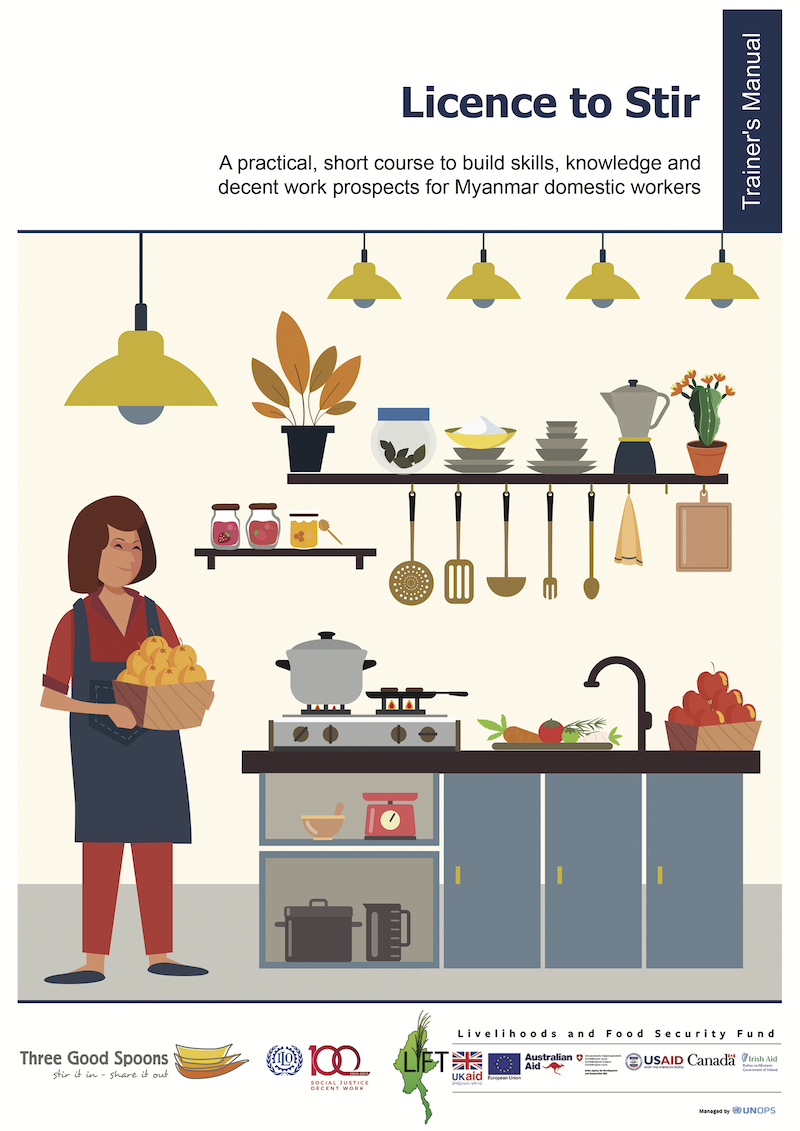License to Stir Training Programme for Domestic Workers
A practical, short course to build skills, knowledge and decent work prospects for Myanmar domestic workers
Curriculum Overview

Competency standards
The International Labour Organisation (ILO) has published Regional Model Competency Standards for Domestic Workers. These form a framework for the Licence to Stir curriculum structure, learning objectives and learning outcomes.
Learners
The Licence to Stir curriculum is designed to enable people with limited work experience develop knowledge and practical skills for effective and professional performance as domestic workers and related types of work. Course participants (Learners) are expected to have an intention of applying the knowledge and skills they have acquired for work either in an entry-level hospitality or domestic work position or related type of work. Women are encouraged to participate.
Trainers
The Licence to Stir curriculum is designed to enable people with working skills and practical experience as domestic workers or subject specialists to deliver lessons to participants (Learners). The Trainer notes are designed as step-by-step instructions, where the Trainer assumes the role of conveying information, demonstrating key techniques or behaviours, leading group activities and facilitating group discussions and Learner participation. Trainers are also responsible for completing and collecting learning evaluations (Learner progress checks).
Curriculum structure and delivery
The Licence to Stir curriculum is designed to be delivered in intensive format over 5 weeks, allowing for 1 – 2 days of rest between weeks. The order of units aims to build and consolidate Learner skills and knowledge progressively.
Project Overview
The Licence to Stir curriculum has been developed through a partnership between Three Good Spoons Limited and the International Labour Organisation Myanmar as part of a broader ILO project called “Developing International and Internal Labour migration Governance in Myanmar”. This broader project is funded by the Livelihood and Food Security Trust Fund (LIFT). More information about the ILO project is available at https://www.ilo.org/yangon/projects.
Three Good Spoons Limited is a Yangon-based cooking school operating as a not-for-profit social enterprise to promote decent work for domestic workers. Three Good Spoons focuses on building skills and knowledge about nutrition, hygiene and cooking for the domestic setting to promote improved health outcomes and livelihoods for Myanmar women and the wider community. Three Good Spoons also works to improve understanding about what constitutes a fair wage and decent working conditions for domestic workers. In addition to the Licence to Stir curriculum project, Three Good Spoons is working in partnership with the ILO to develop and distribute a Decent Work Toolkit to provide practical resources that help domestic workers and household employers put decent work principles into action. For more information on this, please view our Good Practice Guide.
Unit (1) Communicating and domestic work
Lesson (1) Decent work and Domestic workers
Topic 1. What is domestic work
Topic 2. Skills and knowledge for domestic work
Topic 3. Value and challenges of domestic work
Topic 4. Introduction to decent work
Lesson (2) Communication for Domestic Workers
Topic 1. Active listening
Topic 2. Silent communication
Topic 3. Effective listening and explaining methods
Topic 4. Active explaining methods
Lesson (3) English for domestic workers
Lesson (4) Effective self-management
Topic 2. Time management
Topic 3. Professional work attitude
Lesson (5) Rights for domestic workers
Topic 2. Contracts and team work
Topic 3. Agreeing on a work contract
Unit (2) Health and safety for domestic workers
Lesson (1) Health and safety for domestic workers
Topic 2. Fire and Gas Safety
Topic 3. Topic Electrical safety
Topic 4. Topic Chemical safety
Lesson (2) Personal emergency preparation
Topic 2. Emergency go bag
Topic 3. Personal Emergency Exit plan
Lesson (3) Basic First Aid
Lesson (4) Basic Self Defence
Lesson (5) Essential financial literacy
Unit (3) Essential hygiene for domestic work
Lesson (1) Basic Home and Personal Hygiene
Topic 2. Germs and disease
Topic 3. Cleaning to break the chain of germs
Lesson (2) Cleaning bathroom and toilets
Topic 2. Cleaning hard floors
Topic 3. Cleaning surfaces
Lesson (3) Health and safety for domestic
Topic 2. How to wash dishes by hand
Topic 3. Clean oven
Topic 4. Defrost and Clean refrigerator
Topic 5. Cleaning kitchen equipment
Unit (4) Nutrition and kitchen hygiene for domestic cooks
Lesson (1) Essential nutrition for home cooks
Topic 2. Nutritious foods and balanced meals
Topic 3. Different diets
Topic 4. Food allergies
Lesson (2) Food Handling and Ingredient Preparation
Topic 2. Preparing to Cook
Topic 3. Measuring Ingredients
Topic 4. Food Storage and Organisation
Unit (5) Healthy cooking for domestic work
Lesson (1) Prepare a chunky and smooth soup
Lesson (3) Prepare Rice and Pasta with Tomato Sauce
Lesson (4) Prepare Fish, Meat and Poultry
Lesson (5) Prepare Eggs
Lesson (6) Prepare Vegetables as a Side Dish
Lesson (7) Prepare curry
Lesson (8) Prepare Fruit Salad and Fruit Smoothie
Video Guides
Household Employer Guidance
VIEW FULL PLAYLIST ON YOUTUBE
Get in Touch



DIGITALLY POWERED BY THE SUPPORT OF:



